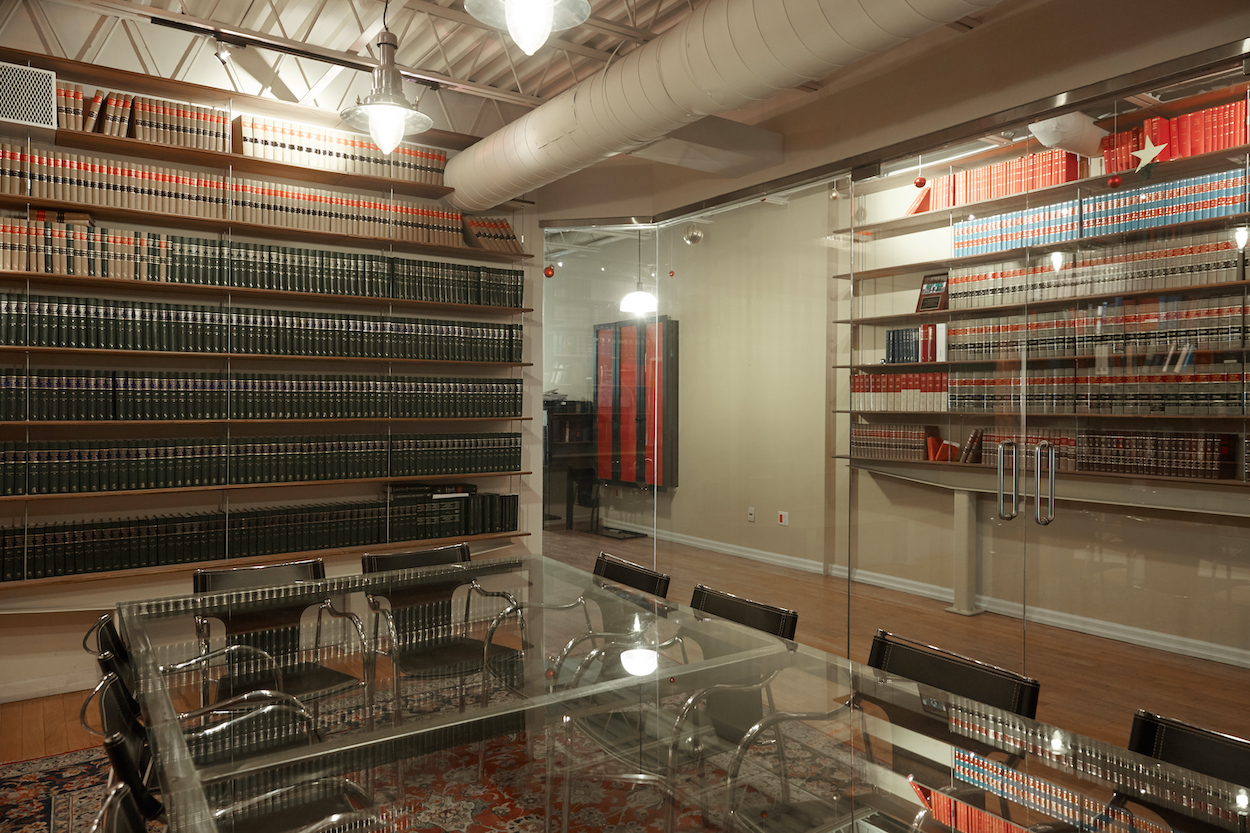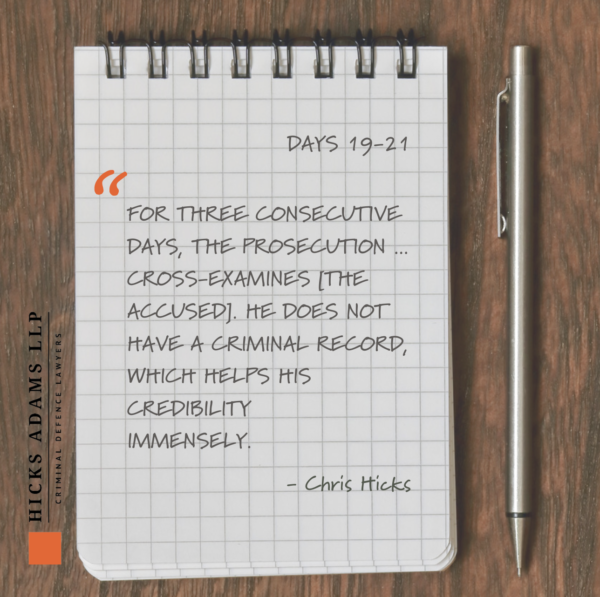Criminal defence lawyer and partner at Hicks Adams LLP Christopher Hicks has written a series of journal entries to take readers behind the scenes of something few people have exposure to: a trial for first-degree murder. In these journals, readers will experience the daily progress of a trial from the defence lawyer’s point of view, with the lawyer’s perspective on everything including witness testimony, judicial rulings and legal strategy.
Making this series especially unique is the fact that this is the first jury trial to go forward in Ontario after the start of the Covid-19 pandemic. With new safety protocols in place, everything is different from the placement of the jury, the lack of observers in the public gallery and even the freedom of movement for the lawyers.
In a nine-part series, Christopher Hicks will take readers through the highly unusual process of running a murder trial during a pandemic, providing rare insights and information as you follow along on the journey from start to finish. See previous installments by clicking on the links below:
Part 1; Part 2; Part 3; Part 4; Part 5; Part 6; Part 7
DAYS 19-21
For three consecutive days, the prosecution (Lisa Wannamaker) cross-examines Robbie McGregor. He does not have a criminal record, which helps his credibility immensely.
It also helps when it comes to the judge’s instruction to the jury before they begin deliberations. Had McGregor had a record for other criminal offences, Justice Bird would have been obliged to instruct the jury as follows:
“As you know, the accused has a criminal record. You may use this record to measure his credibility, but you cannot use it to infer that he is more likely to have committed the offence with which he is charged before you.”
This is, in my view, one of the most difficult judicial instructions to a jury in criminal law, and the one most likely to fail to persuade jurors. It is tantamount to a trial judge saying to a jury, “The accused is a felon. But you cannot conclude from his criminal antecedents that this criminal committed this crime.”
This asks too much of jurors in my view.
In any event, Robbie McGregor escapes this problem. He presents himself as well as can be hoped under cross-examination and his demeanour is acceptable. He is calm and polite and looks often at the jurors when answering questions.
Robbie McGregor was a necessary defense witness, but he was also a good witness on his own behalf. The hours of preparation were well spent. However, Robbie McGregor will be assessed by the members of the jury as any witness is. Jurors can believe all, part or none of what any witness says.
His narrative of the events on July 2 was difficult, and from time to time he stumbled and was caught in inconsistencies. Robbie McGregor in general had difficulty admitting any flaw, or wrongdoing, or even anything negative on his part in general.
Given that he was a male who admitted inflicting 16 wounds on a petite woman that caused her death, this deficit may well have rendered him as cold and callous in the eyes of the jury and may have impacted the jury’s assessment of his credibility.
Credibility is the first issue in a jury’s assessment of a witness. The jury must decide whether the witness is credible and trying to tell them the truth. The law asks that in making this decision, jurors rely on their life experience, logic and their collective common sense. This is the same set of values we employ in everyday life when we are required to determine if someone is being sincere and candid with us.
The second issue that arises in the jury’s assessment of a witness is their reliability. The witness must be in such a position that his or her testimony can be relied upon. An eyewitness may try to describe an event, for example, but the jury may decide they cannot rely on the witness because of distance, darkness or other impediments to the witness’s line of sight.
Thus, a jury may find a witness is credible, is trying to tell them the truth, but also find the witness is not reliable. Of course, if the jury does not find a witness credible, there is no need to assess reliability.
Juries do not give reasons for their verdicts and are sworn to secrecy about their deliberations, but Robbie McGregor was the last witness in this trial. The jurors are now in a position to assess all the witnesses in this trial in the context of all the evidence they have heard. The juror’s assessment of Robbie McGregor as a witness will not be found in reasons but in the verdict they reach.
The core of Robbie McGregor’s testimony is that he sincerely and honestly believed that his daughter had been sexually abused, likely by Jessup. He immediately contacted Joanne MacKenzie so they could deal with this issue together, as they had customarily done in the past with issues about their daughter. He would pick her up in Peterborough and the two would then return to the farm where their daughter had been spending the Canada Day weekend. Then they could both speak to her about any abuse.
Much depended on Robbie McGregor’s narrative of these events. And there was no other witness to support or corroborate his testimony about the alleged sexual molestation of his daughter. His testimony stands alone.
Jurors did not necessarily have to accept what Robbie McGregor said, but his testimony at least had to raise a reasonable doubt to be acquitted of first-degree murder. The theory of the prosecution was that the daughter’s alleged molestation was an outright lie, designed to lure Joanne MacKenzie into a vulnerable position. Her homicide constituted first-degree murder because her luring was an important part of a planned and deliberate murder.
Alternatively, the prosecution argued this was a ‘constructive first-degree murder’, in that the luring of Joanne MacKenzie led to her death while she was kidnapped and forcibly confined.
The other issue upon which Robbie McGregor’s testimony had to at least raise a reasonable doubt was his partial defence of provocation. Although the burden was on the prosecution to prove beyond a reasonable doubt that provocation did not apply, Robbie McGregor’s testimony and credibility were very much factors.
Stay tuned for the final instalment in this series, which will be posted next week.
Christopher Hicks is one of the founding partners of the criminal law firm of Hicks Adams. He has been practicing criminal law for more than two and a half decades, with a special interest, and extensive experience, in jury trials and appeals. In the course of his career, Christopher has been involved in scores of jury trials involving the most serious crimes in the criminal code, has argued appeals of both conviction and sentence in the court of appeal on a regular basis, and has represented clients in the Supreme Court of Canada on more than a half dozen occasions.
To reach Christopher or any of the experienced and dedicated criminal lawyers at Hicks Adams, contact the firm at 416-975-1700 or online to discuss your matter in confidence.



